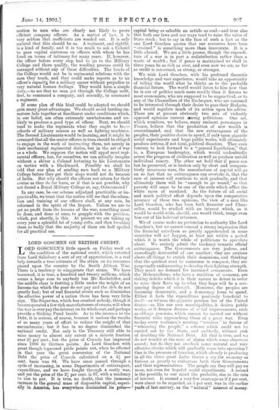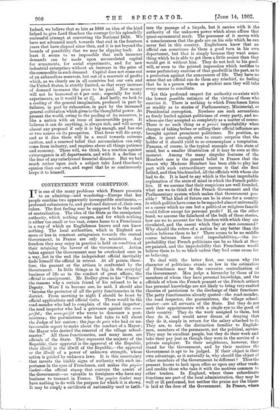LORD GOSCHEN ON BRITISH CREDIT. T4 ORD GOSCHEN'S little speech on
Friday week on the condition of the national credit, which extorted from Lord Salisbury a sort of cry of appreciation, is a real help towards a true estimate of the strain on its resources placed upon the country by the South African War. There is a tendency to exaggerate that strain. We have borrowed, it is true, a hundred and twenty millions, which seems a large sum to anybody but Mr. Rockefeller, and the middle class is fretting a little under the weight of an Income-tax which the poor do not pay and the rich do not greatly feel ; but of real financial strain such as diminishes the effective power of a nation there has been very little sign. The Sugar-tax, which has crushed nobody, though it has exasperated a few rich manufacturers of sweets, will when the war is over pay the interest on its whole cost, and perhaps provide a Sinking Fund beside. As to the increase to the Debt, it is serious, of course, because it undoes the results of so many years of effort to reduce the weight of that encumbrance ; but it has in no degree diminished the national credit. Not only is the Treasury still able to raise money to almost any extent at a minute fraction over 24 per cent., but the price of Consols has improved since 1888 by thirteen points. As Lord Goschen with great though repressed pride points out, when he effected m that year the great conversion of the National Debt the price of Consols calculated on a 24 per cent. basis was 84. We have since passed through a cycle of increasing, in some Departments of extravagant, expenditure, and we have fought through a costly war, and yet the price of the 24 per cent. is 97, with a tendency to rise to par. It is true, no doubt, that the immense increase in the general mass of disposable capital, especi- ally in America, has everywhere diminished its price— capital being as saleable an article as coal—and true also that both our laws and our ways tend to raise the value of State stock ; but to say in the face of such a fact as the one Lord Goschen quotes that our resources have been " strained " is something more than inaccurate. It is a little absurd. We are a little poorer, though the expendi- ture of a war is in part a redistribution rather than a waste of wealth ; but if peace is maintained we shall in three years be as rich as ever, and even now we are, as far as credit is concerned, as strong, or stronger.
We wish Lord Goschen, with his profound theoretic knowledge and vast experience, would take an opportunity of telling the world what he thinks as to the probable financial future. The world would listen to him now that he is out of politics much more readily than it listens to most economists, who are supposed to be unpractical, or to any of the Chancellors of the Exchequer, who are assumed to be interested through their desire to pass their Budgets, and would regulate much of its action upon his advice. There are at present obviously two sets of violently opposed opinions current almong politicians. One set, which numbers, we believe, many eminent personages in France, believe that the production of new wealth is overestimated, and that the new extravagance of the peoples, their positive desire to spend, if only upon gigantic social experiments and huge public works, will ultimately produce serious, if not fatal, political disasters. They even venture to look forward to a "general liquidation," that is, a European bankruptcy, which would undoubtedly arrest the progress of civilisation as well as produce untold individual misery. The other set hold that if peace can but be preserved, or is broken only by short and compara- tively innocuous wars, the manufacture of capital will go on so fast that no extravagance can overtake it, that the rate of interest will continue to sink gradually, and that ultimately there will be "enough to go round," so that poverty will cease to be one of the evils which afflict the white races of mankind. As the future of all social and much political effort depends upon the comparative accuracy of these two opinions, the view of a man like Lord Goschen, who has been both financier and Chan- cellor, would be studied with an interest which, as it would be world-wide, should, one would think, tempt even him out of his habi foal reticence.
We of course make no pretension to authority like Lord Goschen's, but we cannot conceal a strong impression that the financial cataclysm so greatly apprehended in some countries will not happen, at least not within a period which it is worth the while of politicians to speculate about. We entirely admit the tendency towards official extravagance. The Governments are very jealous, and exceedingly distrustful of one another; they are anxious above all things to enrich their dominions, and thinking that the quickest road to commerce is conquest, they are perpetually endeavouring to develop their fighting strength. They resist no demand for increased armaments. Even the Hohenzollerns, who have a tradition of economy, are risking deficits which it is their nature to detest in order to raise their fleets up to what they hope will be a con- quering degree of strength. Moreover, the peoples are becoming democratic, and a democracy loves to spend. Either it feels the expenditure positively beneficial to itself—as witness the gigantic pension list of the United States—or, like our own municipalities, it desires public works, or it dreams dreams of sccial improvements, such as old-age pensions, which cannot be carried out without financial risks approaching those of a great war. Even to-day every workmen's meeting " resolves " in favour of "rehousing the people," a scheme which could not be carried out by the State, and suddenly, without risk of doubling the National Debt. All that is true, and we do not wonder at the note of alarm which some observers sound ; but do they not overlook some natural and very effective checks which will gradually come into operation ? One is the pressure of taxation, which already is producing in all the three great Latin States a cry for economy so furious as greatly to embarrass both their Governments and their representatives. The people say they will pay no more, not even for hopeful social experiments. A second is the possible, to our mind the probable, rise in the rate of interest. It seemed a very few years ago as if 2 per cent. were about to be regarded. as 5 per cent. was in the earlier yeah of last century, as the " natural " interest of money. Indeed, we believe that so late as 1888 an idea of the kind helped to give Lord Goschen the courage for his splendidly successful attempt at converting the National Debt. We have not advanced much towards that end in the fourteen years that have elapsed since then, and it is not beyond the bounds of possibility that we may be slipping back. At least it seems to us impossible that such immense demands can be made upon accumulated capital for armaments, for social experiments, and for new industrial enterprises without an increase in the price of the commodity in such demand. Capital does not come out of an exhaustless reservoir, but out of a reservoir of profits which, as we clearly see in all countries but our own and the 'United States, is strictly limited, so that every increase of demand increases the price to be paid. Now money will not be borrowed at 4 per cent., especially for risky experiments, as it would be at 21. And lastly, we look to a cooling of the general imagination, produced in part by failures, in part by exhaustion, in part by the increased general cultivation which gives to the thoughtful power. At present the world, owing to the pooling of its resources, is like a nation with an issue of inconvertible paper. It believes it can do anything, is always rich, and will accept almost any proposal if only it is big enough, and has one or two names on its prospectus. That fever will die away, and as it dies there will be a recoil towards extreme caution, and a renewed belief that accumulation can only come from industry, and requires above all things patience and economy. There will, we think, be a reaction against extravagance in all departments, and with it a decline of the fear of any cataclysmal financial disaster. But we had much rather upon such a subject take Lord Goschen's opinion than our own, and regret that he so continuously keeps it to himself.











































 Previous page
Previous page